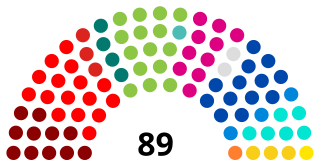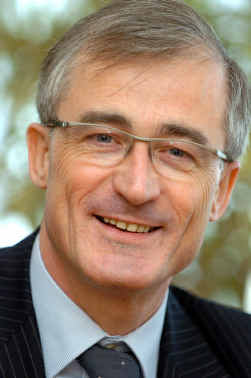
Brussels, officially the Brussels-Capital Region, is a region of Belgium comprising 19 municipalities, including the City of Brussels, which is the capital of Belgium. The Brussels-Capital Region is located in the central portion of the country and is a part of both the French Community of Belgium and the Flemish Community, but is separate from the Flemish Region and the Walloon Region, located less than 4 kilometres (2.5 mi) to the south. Historically Dutch-speaking, Brussels saw a language shift to French from the late 19th century. Nowadays, the Brussels-Capital Region is officially bilingual in French and Dutch, although French is the majority language and lingua franca. Brussels is also increasingly becoming multilingual. English is spoken widely and many migrants and expatriates speak other languages as well.

Flanders is the Dutch-speaking northern portion of Belgium and one of the communities, regions and language areas of Belgium. However, there are several overlapping definitions, including ones related to culture, language, politics, and history, and sometimes involving neighbouring countries. The demonym associated with Flanders is Fleming, while the corresponding adjective is Flemish, which can also refer to the collective of Dutch dialects spoken in that area, or more generally the Belgian variant of Standard Dutch. The official capital of Flanders is the City of Brussels, although the Brussels-Capital Region that includes it has an independent regional government. The powers of the government of Flanders consist, among others, of economic affairs in the Flemish Region and the community aspects of Flanders life in Brussels, such as Flemish culture and education.

The politics of Belgium take place in the framework of a federal, representative democratic, constitutional monarchy. The King of the Belgians is the head of state, and the prime minister of Belgium is the head of government, in a multi-party system. Executive power is exercised by the government. Federal legislative power is vested in both the government and the two chambers of parliament, the Senate and the Chamber of Representatives. The federation is made up of (language-based) communities and (territorial) regions. Philippe is the seventh and current King of the Belgians, having ascended the throne on 21 July 2013.

Belgium is a federal state comprising three communities and three regions that are based on four language areas. For each of these subdivision types, the subdivisions together make up the entire country; in other words, the types overlap.

The Parliament of the Brussels-Capital Region, is the governing body of the Brussels-Capital Region, one of the three regions of Belgium. It is also known as the Brussels Regional Parliament.

In Belgium, the French Community refers to one of the three constituent constitutional linguistic communities. Since 2011, the French Community has used the name Wallonia-Brussels Federation, which is controversial because its name in the Belgian constitution has not changed and because it is seen as a political statement. The name "French Community" refers to Francophone Belgians, and not to French people residing in Belgium. As such, the French Community of Belgium is sometimes rendered in English as "the French-speaking Community of Belgium" for clarity, in analogy to the German-speaking Community of Belgium.

The Flemish Region, usually simply referred to as Flanders, is one of the three regions of Belgium—alongside the Walloon Region and the Brussels-Capital Region. Covering the northern portion of the country, the Flemish Region is primarily Dutch-speaking. With an area of 13,522 km2 (5,221 sq mi), it accounts for only 45% of Belgium's territory, but 57% of its population. It is one of the most densely populated regions of Europe with around 490/km2 (1,300/sq mi).

The Federal Parliament is the bicameral parliament of Belgium. It consists of the Chamber of Representatives and the Senate. It sits in the Palace of the Nation. The Chamber of Representatives is the primary legislative body; the Senate functions only as a meeting place of the federal communities and regions.

The Flemish Community is one of the three institutional communities of Belgium, established by the Belgian constitution and having legal responsibilities only within the precise geographical boundaries of the Dutch-language area and of the bilingual area of Brussels-Capital. Unlike in the French Community of Belgium, the competences of the Flemish Community have been unified with those of the Flemish Region and are exercised by one directly elected Flemish Parliament based in Brussels.

The Senate is one of the two chambers of the bicameral Federal Parliament of Belgium, the other being the Chamber of Representatives. It is considered to be the "upper house" of the Federal Parliament. Created in 1831 as a chamber fully equal to the Chamber of Representatives, it has undergone several reforms in the past, most notably in 1993 and 2014. The 2014 elections were the first without a direct election of senators. Instead, the new Senate is composed of members of community and regional parliaments and co-opted members. It is a chamber of the communities and regions and serves as a platform for discussion and reflection about matters between these federated entities. The Senate today plays a minor role in the federal legislative process. However, the Senate, together with the Chamber, has full competence for the Constitution and legislation on the organization and functioning of the Federal State and the federated entities. Since the reform of 2014, it holds about ten plenary sessions a year.

The area within Belgium known as Brussels-Halle-Vilvoorde encompasses the bilingual—French and Dutch—Brussels-Capital Region, which coincides with the arrondissement of Brussels-Capital and the surrounding Dutch-speaking area of Halle-Vilvoorde, which in turn coincides with the arrondissement of Halle-Vilvoorde. Halle-Vilvoorde contains several municipalities with language facilities, i.e. municipalities where French-speaking people form a considerable part of the population and therefore have special language rights. This area forms the judicial arrondissement of Brussels, which is the location of a tribunal of first instance, enterprise tribunal and a labour tribunal. It was reformed in July 2012, as part of the sixth Belgian state reform.
The seven institutions of the European Union (EU) are seated in four different cities, which are Brussels (Belgium), Frankfurt am Main (Germany), Luxembourg (Luxembourg) and Strasbourg (France), rather than being concentrated in a single capital city. All four were chosen, among various reasons, for their location halfway between France and Germany, the countries whose rivalry led to two World Wars and whose reconciliation paved the way for European integration. The EU agencies and other bodies are located all across the union, but usually not fixed in the treaties. The Hague is the only exception, as the fixed seat of the Agency for Law Enforcement Cooperation (Europol). Luxembourg City is the EU capital that can lay claim to having the most of the seven EU institutions based wholly or partly upon its territory, with only the European Council and European Central Bank not having a presence in the city. Over the years, Brussels has become the EU's political hub, with the College of the Commissioners – the European Commission's politically accountable executive – and the European Council both meeting at their Brussels-based headquarters, and the European Parliament and Council of the EU holding the majority of their meetings annually within the city. This has led media to describe it as the de facto "capital of the EU".

Brussels (Belgium) is considered the de facto capital of the European Union, having a long history of hosting a number of principal EU institutions within its European Quarter. The EU has no official capital but Brussels hosts the official seats of the European Commission, Council of the European Union, and European Council, as well as a seat of the European Parliament. In 2013, this presence generated about €250 million and 121,000 jobs. The main rationale for Brussels being chosen as "capital of the European Union" was its halfway location between France, Germany and the United Kingdom, the three countries whose rivalry played a role in starting the two World Wars and whose reconciliation paved the way for European integration.

An election of the delegation from Belgium to the European Parliament was held on Sunday, 7 June 2009. The elections were on the same day as regional elections to the Flemish Parliament, Walloon Parliament, Brussels Parliament and the Parliament of the German-speaking Community.
Regional elections were held in Belgium on 7 June 2009 to choose representatives in the regional parliaments of Flanders, Wallonia, Brussels and the German-speaking Community of Belgium. These elections were held on the same day as the European elections.

The government of the Brussels-Capital Region is the political administration of the Brussels Capital Region of Belgium. An election is held every five years. The government is headed by a Minister-President, four ministers and three state secretaries.
Regional elections were held in Belgium on 25 May 2014 to choose representatives for the Flemish Parliament, Walloon Parliament, Brussels Parliament and the Parliament of the German-speaking Community. These elections were held on the same day as the 2014 European elections as well as the 2014 Belgian federal election.

The 2019 Belgian regional elections took place on Sunday 26 May, the same day as the 2019 European Parliament election as well as the Belgian federal election.

An election was held on 26 May 2019 in the three Belgian constituencies to elect the Belgian delegation to the European Parliament. It was part of the 2019 European Parliament election.














